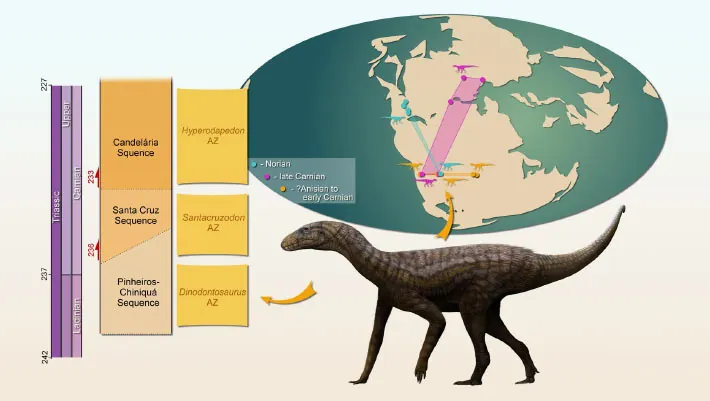
Unraveling Sleep’s Lasting Impact on the Brain: A Scientist’s Groundbreaking Self-Study
2024-10-08
Author: Nur
A recent innovative study reveals astonishing insights about the human brain, particularly the enduring effects of sleep quality. Colombian neurologist Ana Triana Hoyos conducted a unique five-month experiment to examine her brain's responsiveness to external factors such as sleep, stress, exercise, and mood—finding that some benefits, like improved cognitive performance, can last up to 15 days after a solid night's rest.
The Methodology of the Study
In a rather unconventional approach, Hoyos immersed herself in the familiar visuals of The Grand Budapest Hotel, watching segments of the film repeatedly while her brain activity was meticulously recorded through various devices. This intense review was not for entertainment; rather, it aimed to understand how her brain's activity changed over the study period, linking it to her daily physical and psychological activities gleaned from data collected via her phone, smartwatch, and smart ring.
A Divergent Approach
Hoyos's groundbreaking methodology diverges from traditional neuroscience studies that often involve large groups of subjects with limited long-term data, typically capturing a brief moment in time. By focusing solely on her own brain, she was able to conduct an in-depth analysis over 133 days, including 30 fMRI scans that measured aspects like attention, memory, and cognitive responses to visual stimuli.
Significant Findings
The findings, published in the esteemed journal PLoS Biology, indicated profound connections between daily life choices and brain function. Hoyos emphasized the significance of external elements—stressing how they shape neuronal activity akin to a river's flow, always changing yet persistent. “If I throw a stone into the water today, how will it affect the flow? What if it rains?” she posed, illustrating her inquiry into how external influences alter the dynamic of brain activity over time.
Comparison with Other Studies
Remarkably, while her study echoed similar work by Stanford's Russell Poldrack—who also analyzed his brain activity over an extended period—Hoyos's research shifted focus toward sleep and emotional states, contrasting with Poldrack's attention to dietary factors. Innovations in technology since Poldrack’s study provided Hoyos with a more objective data collection mechanism, further enriching the outcomes.
Expert Opinions
Neurologists have critically hailed her research. Jesús Romero, president of the Andalusian Society of Neurology, noted the implications for understanding how external variables might alter brain connectivity and decision-making processes. “By fostering a healthier environment, we may enhance the beneficial experiences that promote positive brain connectivity,” he elaborated.
Challenges Faced by Hoyos
The complexity of being both scientist and subject posed challenges for Hoyos, as she adhered strictly to a methodology that delayed data analysis until after the study. The analysis revealed logical correlations, like the well-documented impacts of poor sleep on cognitive function. Yet there were surprises, such as the profound effect of physical activity on her cognitive agility, and that sleep quality—not quantity—was the true influencer on her performance.
Cautious Interpretation of Results
It is crucial to note the limitations of this study, as findings from a single subject cannot be broadly generalized to the entire population. Ignacio Morgado, a Psychobiology professor at the Autonomous University of Barcelona, voiced caution, suggesting that while revealing, the study’s implications need caution when applied to diverse individuals.
Future Research Directions
Hoyos plans to dive deeper into her findings to answer lingering questions. How long do these cognitive ripples last? Do they accumulate over time, and how would overwhelming external factors—like chronic stress or adverse sleep—alter the trajectory of brain activity? “How many stones must you throw to change the river’s course?” she mused, paving the way for future research that could transform our understanding of the brain's adaptability and resilience.
Implications for Daily Life
This pioneering self-study urges us to re-evaluate our daily habits and environment while considering how they can distinctly shape our cognitive functions, potentially guiding interventions for better mental health and cognitive performance in the long run. Stay tuned—our brains may hold more secrets than we think!




 Brasil (PT)
Brasil (PT)
 Canada (EN)
Canada (EN)
 Chile (ES)
Chile (ES)
 España (ES)
España (ES)
 France (FR)
France (FR)
 Hong Kong (EN)
Hong Kong (EN)
 Italia (IT)
Italia (IT)
 日本 (JA)
日本 (JA)
 Magyarország (HU)
Magyarország (HU)
 Norge (NO)
Norge (NO)
 Polska (PL)
Polska (PL)
 Schweiz (DE)
Schweiz (DE)
 Singapore (EN)
Singapore (EN)
 Sverige (SV)
Sverige (SV)
 Suomi (FI)
Suomi (FI)
 Türkiye (TR)
Türkiye (TR)